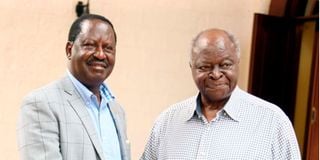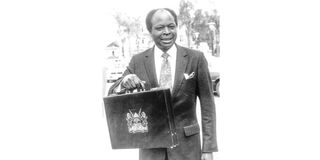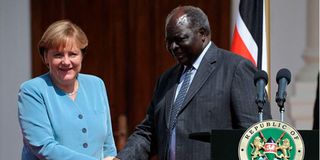Golden memories for Kibaki the great
President Mwai Kibaki, Chief of General Staff Gen Jeremiah Kianga and Minister of State for Defence Yusuf Haji aboard the ceremonial Land Rover as it arrives at the Kenya military parade in Lanet, Nakuru in 2008.
If the late President Mwai Kibaki were to rise up from the dead to witness the immense goodwill for him effortlessly pouring out of the hearts of Kenyans, most likely he would sound his trademark “Oh yes” exclamation.
The common denominator in all the tributes penned, gestured and voiced as the hallmark of his character is greatness.
He is being mourned by those who dined, wined, dealt and worked with him as a man who effaced himself and loathed being made the subject of attention, to the point of turning down all proposals to package him in songs of praise.
His longtime friends ‘accuse’ him of getting the chance to behave like a king but always insisted on living like a servant.

Raila Odinga (left) when he paid former President Mwai Kibaki a courtesy call at Kibaki's Muthaiga residence. Raila will cut short his ongoing US trip and travel back on Wednesday ahead of Kibaki’s state funeral.
“That is how he handled power so sensibly and he is credited with eradicating the excesses of his predecessors where instruments of power had been weaponized. He demystified the seat of power and he became the President who was not bothered on those sensitivities of securities around men and women of his stature,” says Francis Muthaura, who served as his head of public service.
Coast Regional Commissioner John Elung’ata describes Kibaki’s 10-year rule “as the golden decade rule from a golden heart especially manifest in his love for the Kenyan child in whom he invested so much resources in full knowledge that he was safeguarding our future as a country”.
Others describe him as a cunning political fox whose instincts and patience helped him navigate his career.
Kibaki’s longtime friend Mr Matere Keriri, who served as comptroller of the State House during his reign, describes him as a man whose bad side came packaged neatly to ignite even more respect for him.
“It was not that there was no bad side of Mr Kibaki…but that badness was exercised in such a good-hearted way and in a very sensitive manner to a point you respected him more. An example was when I would present to him a position that was not well thought out and he would reprimand me in a manner that incisively exposed my rashness of thought but at the same time gave me ample space to go back to my thoughts and straighten my latitudes,” Mr Keriri told the Nation.
Kitui Governor Charity Ngilu says Kibaki oozed political wisdom, a rare attribute for African leaders.

Mwai Kibaki.
“He was nowhere near being indecisive. I worked with him as his minister for health and water. I am testimony that he made very tough decisions after a session of good listening and he harboured no grudges,” he said.
She says that she learnt from Kibaki that one can be in power and yet be humble and compassionate even in the face of obvious provocation.
“Many a times many schemes that sought to stretch his patience were designed. Yet, he retained that statesmanship and always preached about reconciliation and spreading of hope in times of despair,” she said.
Chris Murungaru, who served as Kibaki’s minister for security and transport, also reveals that before the two joined the government, they had shared drinks for over 20 years.
“I came into government as Kibaki’s friend. When Kibaki trusted a human being, he trusted without hypocrisy. He kept his friends, and [in selecting people] into government, it was his search for hands he could trust,” he said.
Dr Murungaru says Kibaki’s humour rolled out of his tongue naturally.
“I remember in the Cabinet when his minister for local government, Mr Karisa Maitha, announced that he intended to clear the streets of street families … Kibaki asked him where he [would] take them. Mr Maitha responded that it was hard to know their parents, and Kibaki responded to him that he was sure he had seen two or three of the street kids who were copycats of some of his ministers…” he said.
Dr Murungaru says Kibaki was hard to listen to in his public speeches because “in castigating, he kept off personalising and being subjective….”
His Agriculture minister Kipruto arap Kirwa mourns Kibaki as “a man who hated charlatans and scatterbrains around him”.
He says contrary to what most people believed to have been Kibaki’s love of beer, “he could hold on to one beer for three hours”.

In this file photo taken on July 12, 2011 German Chancellor Angela Merkel (left) shakes hands with Kenya's President Mwai Kibaki at the State House in Nairobi.
“His form of expressing distaste for what you were telling him was to look away from you or start a line of conversation totally unrelated to what you are saying. He hated pettiness and leadership that was adding no value to people,” Mr Kirwa said.
Meru Governor Kiraitu Murungi says he remembers Kibaki “as that household name when he was minister for Finance since in scholarly levels he was being described as that brilliant mind serving in a bad regime”.
He says Kibaki would take frustrations with a straight face and rally his troops behind optimism and never soaked himself in negative energy.
Mr Kiraitu eulogises him as an intelligent, calm nationalist, while Siaya Senator James Orengo says that he was only interested in “hearing what he needed to know but not what he needed to hear and was ever ready to listen to contrary opinion”.
Bungoma Senator Moses Wetang’ula describes Kibaki as “the best President ever…Shakespeare said some men are born great, other men acquire greatness and yet others have greatness thrust upon them … Mr Kibaki acquired greatness through sheer hard work and commitment to patriotism”.
Another of Kibaki’s buddies, Mr Joseph Munyao, who served as secretary-general of the Democratic Party and minister in his Cabinet, sums him as “that great thinker who loved to listen more than he spoke”.
Mr Munyao says Kibaki would have done better for Kenya if he had taken the reins of power in 1978.
“He strongly believed that Kenya had all the characteristics of [becoming] a superpower and it only needed good management. He had the clarity of thought and willingness to offer himself for the task…only that it was not designed to be so,” he said.
“But Kenyans were very lucky to have him in office in 2002 for that is the very time the country was on the extreme edge of going bananas. He rescued the country’s economy from total collapse.”
Noah Wekesa, who served as Kibaki’s minister for environment, says “Kibaki was more than a President to this country in that his passion was completely unadulterated in the desire to make a difference”.
He says when Kibaki gave someone a job, he was never interested in sideshows.
“He trusted his ministers and he was not the man to bypass you and the responsibilities that he had assigned you so as to please cronies. He always referred all who sought his intervention on any issue related to ministries to the minister in charge. He would only be interested in knowing if the minister was reluctant to help,” he said.
Kibaki’s golfing friend and businessman Joe Wanjui mourns him as “a man who many misconstrued as a coward…when his real identity was a rock packaged in gentleness”.
He was civil, polite and a go-getter who concealed his anger well.
“He was a good listener who liked going through all ideas presented to him with a fine comb. He was such an intelligent man that he would always pick the deception in ideas such that you were better off being honest with him,” My Wanjui said.
“Very many people found it very hard to understand Kibaki simply because not many matched his intellect. But that is not important, [what’s] important is his legacy….”
Longtime career administrator Joseph Kaguthi describes Kibaki as “a man who seethed in cool anger against ineptitude and dereliction of duty”. He says Kibaki could hit the roof in anger, especially against “intellectuals who behaved like fools”.
He says those around Kibaki were unanimous that he was a genius who never required lengthy presentations to grasp issues.
“He had the tendency to demand being addressed by people with straight thoughts and with clarity of mind. He hated people who were not in haste to make their point … Kibaki hated narratives, especially those that had no intellect,” he said.
Kibaki’s vice-president Moody Awori describes him as a man who had a rock in place of a heart.
“The man was simply astute in keeping emotions to himself…He led as a team leader who knew the first sign of despair was not supposed to come from him. He knew if he cracked, the rest of us would sink the ship,” he said.
Narc Kenya party leader Martha Karua remembers Kibaki as one who valued including women in decision-making, a democrat par excellence who entertained no power brokers and their gossip.
“Mr Kibaki only entertained work-related banter that was aimed at getting the job done. All those who served to derail progress were unwelcome and he abhorred them. Kibaki was the mind that birthed performance in ministries and his only interest from those he recruited to help him deliver was performance, nothing else,” she said.
Nominated Senator Beth Mugo says as early as 1967, she had concluded that Kibaki would one day become President and serve the country and her people well.
“All around him were unanimous that his singular motivation was to serve. He appeared to know what was ailing his dockets and what therapy was needed. He revolutionised his dockets to emerge top performers. Even Mzee Jomo Kenyatta never hid his admiration for the man who appeared shy publicly, timid to the irrational but a man of steel to those who knew what to look for in great men,” she said.
Kibaki’s head of public service, Francis Kimemia, describes him as a man who hated negative minds.
“He would never tire of telling us that we were in government to lead people to overcome their challenges. He believed that the start of government failure was when its leaders became crybabies. He believed that there was a solution to all challenges. Above all, he hated criminals,” he said.
Mr Kimemia says “this was the President who would stand with you and absolve you from blame if you messed up in pursuit of the common good”.
Former Equity Bank chairman Peter Munga describes Kibaki as a “man who would work out financial problems without the use of a pen”.
He says Kibaki loved the world of mathematics and dissected budgets from the point of view of their real benefit to the people and their occupations.
“He abhorred all those who were in the habit of abusing figures with an intention [of packing] some cash for looting,” he said.
Mr Munga says Kibaki liked precise costing and even the cents mattered to him.
“He was not a man to work with rounded figures…he always insisted on proper accounts and was not the man to go for estimations. He wanted his figures right,” he said.
Mr Munga remembers Kibaki as the one who reinvigorated financial markets, evened trade by ensuring imperfect competition was eradicated and introduced the culture of tax burden bargains and rebates to help indigenous companies remain afloat.
Royal Media Services (RMS) chairman Samuel Kamau (SK) Macharia remembers the late Kibaki as helping “local investors maximise their potential by eradicating vendetta-driven governance that had become entrenched in the 24 years of his predecessor, Daniel Moi”.
Businessman Kiprono Kittony summed up Mr Kibaki as “the fallen hero who was the perfect example of level-headedness and whose transformational service to Kenya and her people is not fiction but boldly and conspicuously there for all to identify with”.





